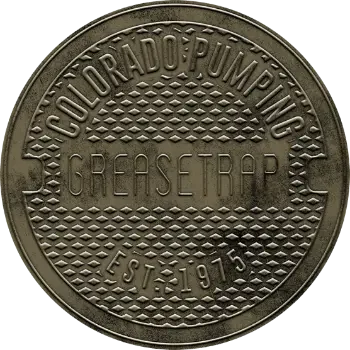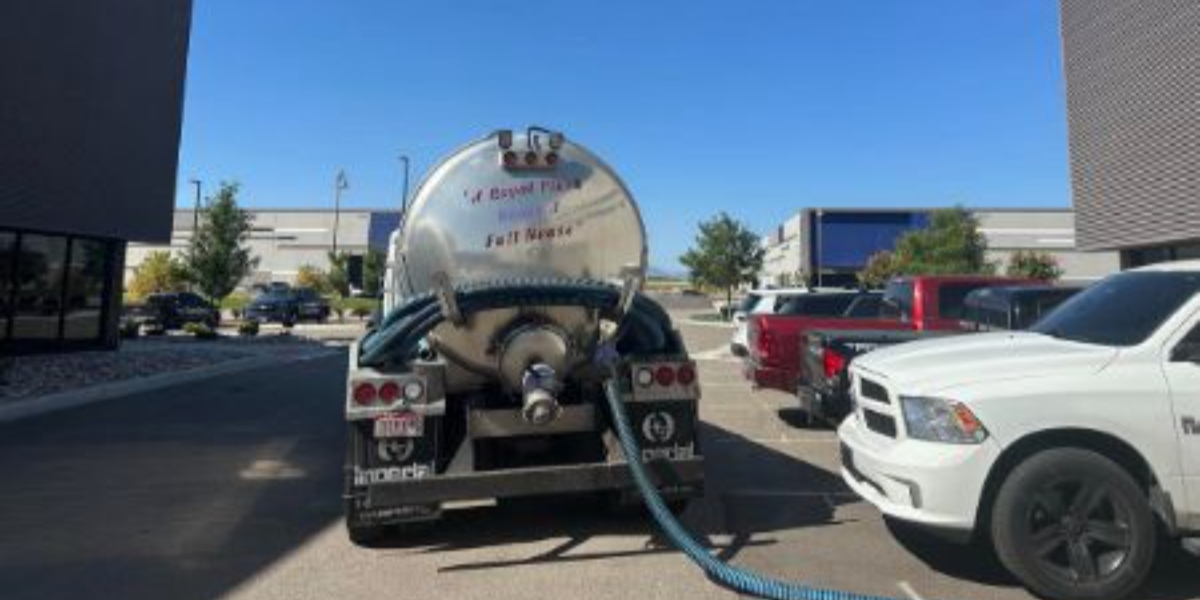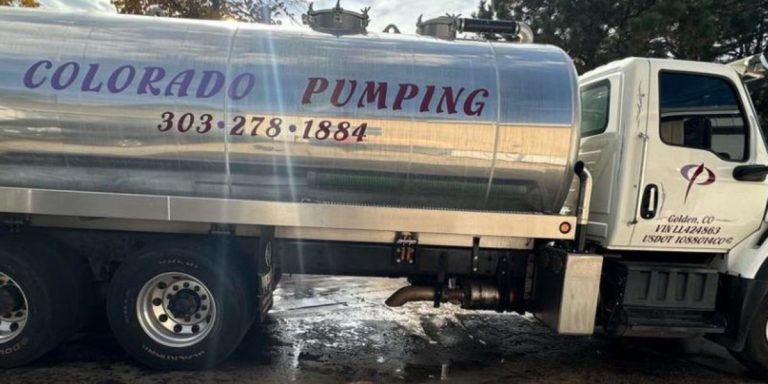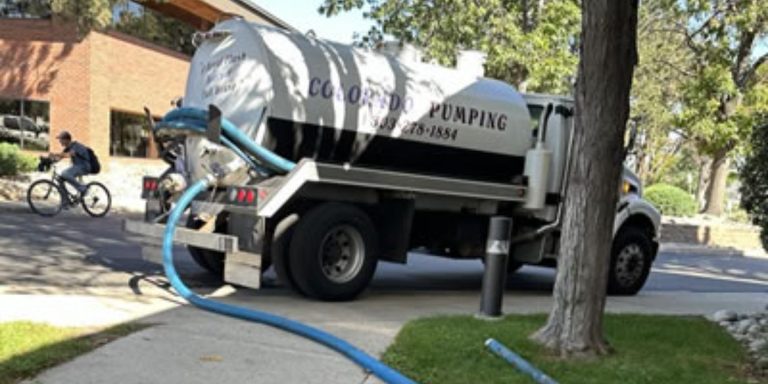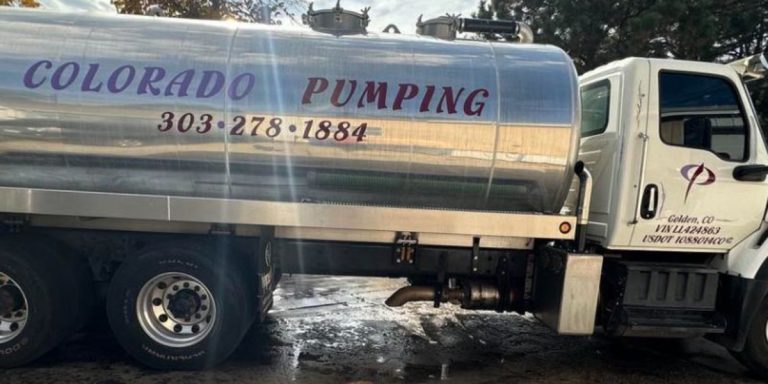Signs you Need to Pump your Grease Trap
If you operate a restaurant, cafeteria, or any commercial kitchen in the Denver Metro area, your grease trap is one of the most important systems you maintain. It protects your plumbing, prevents health code violations, and keeps your business running smoothly. Yet it’s also one of the most commonly overlooked pieces of equipment. When a grease trap isn’t pumped on schedule, small warning signs can quickly turn into expensive emergencies.
At Colorado Pumping, we’ve been helping food service businesses across the Denver Metro region keep their grease traps, septic systems, and lift stations operating efficiently since 1978. As a licensed and insured company, we know exactly how to spot the early signs that a grease trap needs attention, and what can happen if you wait too long.
This guide explains the most common indicators that your grease trap is full, what causes them, and how professional maintenance can prevent costly downtime.
Why grease trap maintenance matters
Every sink, floor drain, and dishwasher in your kitchen sends wastewater into your plumbing system. This water contains fats, oils, and grease, known as FOG. A grease trap captures FOG before it enters the sewer or septic system, allowing only cleaner water to pass through.
Over time, these materials build up inside the trap. If not removed, the layer of grease and solids grows thick enough to block flow. Once that happens, you’re dealing with slow drains, backups, and odors that can disrupt business operations.
Routine grease trap pumping from Colorado Pumping eliminates these problems before they start. We help restaurants, schools, hotels, and institutions throughout Denver stay compliant with local environmental regulations while keeping their kitchens safe and functional.
The top signs your grease trap needs pumping
Grease traps don’t fail overnight, they lose efficiency gradually. Recognizing the early warning signs helps you act before a major problem develops.
1. Slow or backed-up drains
If your sinks or dishwashers are draining slowly, your grease trap could be nearing capacity. As grease and solids build up, less space remains for water to flow freely.
-
-
- Standing water or delayed drainage
- Water backing up into sinks or floor drains
- Frequent need for plunging or line cleaning
-
When these symptoms appear, it’s time to schedule a professional cleaning before a full blockage occurs.
2. Unpleasant odors
A sour, rancid, or “rotten egg” smell near your sinks, floor drains, or grease trap often means decomposing grease inside the unit. These odors can quickly spread throughout your kitchen or dining area.
-
-
- Smells worsen after hot water or cleaning chemicals are used
- Odors return soon after washing floors or dishes
- Customers or staff comment about a lingering “greasy” smell
-
Routine pumping removes the trapped material and eliminates the source of these unpleasant odors.
3. Grease or residue around drains
Visible grease around sink drains or floor areas is a clear indicator of overflow. When traps are full, grease can escape back through the system.
-
-
- Slippery film near drains or on floors
- Residue that returns after cleaning
- Difficulty keeping floors grease-free
-
This not only signals a maintenance problem but can also pose safety hazards for employees.
4. Gurgling or bubbling sounds
When grease buildup restricts water flow, air gets trapped in the pipes, causing gurgling noises.
-
-
- Bubbling sounds after turning off water
- Air or foam pushing up through drains
- Intermittent blockages that clear temporarily
-
These noises mean your system is working harder than it should, a sign that pumping is overdue.
5. Frequent drain clogs or emergency calls
If your plumbing company is visiting more often, your grease trap is likely the cause.
-
-
- Repeated sink or floor drain clogs
- Increasing plumbing maintenance costs
- Backups occurring soon after cleaning
-
Professional grease trap pumping stops the problem at its source instead of treating symptoms downstream.
6. Overflow or leakage near the trap
Seeing water or grease seeping around the trap’s lid or access area means it’s beyond full.
-
-
- Visible overflow or wet spots around the unit
- Corroded or loose fittings
- Strong odors accompanying leaks
-
At this point, your system needs immediate attention to avoid damage or sanitation violations.
7. Health inspection warnings or citations
If a local health inspector notes grease management issues or recommends cleaning, it’s a clear signal your trap isn’t being maintained properly. Denver-area businesses are required to follow FOG disposal standards, and ignoring them can result in fines or forced closures.
How often you should schedule grease trap pumping
While these signs are important, the best approach is prevention. Most commercial kitchens need grease trap pumping every one to three months, depending on:
-
- The size of your trap
- The amount and type of food preparation
- Local Denver regulations
- The number of meals served per day
At Colorado Pumping, we follow the 25 percent rule, when the grease and solids reach one-quarter of the trap’s depth, it’s time to pump. Our technicians measure, record, and monitor levels during each visit to determine the best schedule for your operation.
What happens during professional grease trap pumping
Proper cleaning requires specialized equipment and an experienced team. Here’s what our process includes:
-
- Inspection and assessment – We locate and open the trap, measure grease depth, and check for structural concerns.
- Vacuum removal – Our 3,500-gallon vacuum trucks remove all grease, solids, and water.
- Scraping and cleaning – We manually remove hardened buildup from interior walls and baffles.
- System check – Technicians inspect gaskets, seals, and fittings for wear.
- Proper disposal – All waste is transported to approved disposal facilities, keeping your business fully compliant.
- Documentation – We provide a detailed service report for your records and inspections.
This complete process restores capacity, improves performance, and ensures your system meets local environmental standards.
Case study: how regular service prevented a shutdown
A busy restaurant in downtown Denver called Colorado Pumping after repeated backups and strong odors forced them to close their kitchen during dinner service. Our team arrived that evening, found the grease trap more than 80% full, and performed a complete cleaning.
We then scheduled a recurring 45-day maintenance plan tailored to their usage. Since adopting regular pumping, they’ve avoided all drain issues and passed every health inspection without incident. Routine maintenance not only kept them compliant but prevented future emergencies.
What happens if you ignore the warning signs
Delaying service can lead to more than just inconvenience.
-
- Clogged pipes and backups – Grease hardens and blocks the plumbing, requiring costly repairs.
- Odor and sanitation issues – Decomposing grease spreads unpleasant smells throughout the building.
- Health department penalties – FOG violations can result in fines or shutdowns.
- Environmental harm – Overflowing grease contaminates soil and groundwater.
- Increased costs – Emergency cleanouts and repairs cost far more than regular maintenance.
Routine grease trap cleaning from Colorado Pumping is a simple way to avoid these risks and protect your investment.
Why Denver businesses trust Colorado Pumping
For over 45 years, Colorado Pumping has been the go-to choice for grease trap, septic, and lift station maintenance across the Denver Metro area. Businesses choose us because:
-
- We are family-owned and operated, serving Colorado since 1978
- Our company is licensed and insured for all pumping and hauling services
- We provide 24-hour emergency pumping when problems can’t wait
- Our technicians are trained, professional, and dependable
- We prioritize environmental responsibility with compliant disposal methods
- Customers consistently give us a 4.9-star rating for reliability and service quality
When your kitchen depends on performance and compliance, trust the experts who’ve been serving Colorado businesses for decades.
Serving Denver Metro and surrounding areas
Colorado Pumping proudly serves businesses and property owners in:
We also offer septic tank pumping, lift station cleaning, and RV park septic services for both commercial and residential clients throughout the Denver area.
Protect your business — schedule grease trap pumping today
Keep your kitchen running smoothly with expert service from Colorado Pumping
Don’t wait for slow drains, odors, or health code issues to signal trouble. Regular pumping ensures your grease trap stays compliant and efficient year-round.
Call (303) 278-1884 or request an estimate online to schedule your next service. We proudly serve Denver, Arvada, Aurora, Golden, and surrounding Colorado communities with reliable grease trap, septic, and lift station maintenance you can count on.
